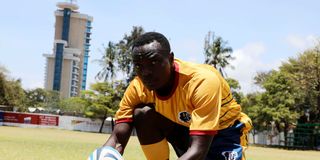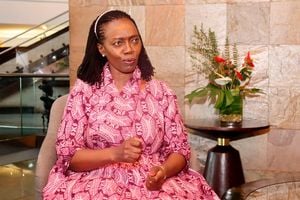Thinking of taking up a sport? You can never go wrong with rugby...

What you need to know:
- I had challenges balancing the two in high school but when I joined university I realised that there is no shortcut or cheat code in navigating between two commitments, you just have to respect each activity.
- When you steal into your academic time during practice then just have to burn the midnight oil.
- When your academics eat into your rugby time, arrange for extra practice sessions. With this in mind, I am able to maintain a good balance.
Collins Amayo, 24, is a centre and winger for Mombasa RFC, a team in the second tier of the Kenya Rugby Union Championship.
In the 2022/23 rugby 15s season, his club won 31-16 against Jomo Kenyatta University (JKUAT Cougars) at RFUEA Grounds in Nairobi on April 15 to lift the title.
Amayo, a former Blakblad rugby player, holds a Bachelor’s degree in Coastal and Marine Resource Management, having graduated in July this year from Kenyatta University in Nairobi.
He is currently seeking employment while dedicating his spare time to rugby.
Take us through your rugby journey…
I was born and raised in a closely-knit family in Mombasa. I attended Sparki Primary School in Tudor, Mombasa, before joining Maseno School for my high school studies from 2015 to 2018. I later joined Kenyatta University in Nairobi in 2019 to study coastal and marine resources management. I am lucky I joined institutions that focused both on students’ academic strengths, and other talents. I tried other disciplines, but nothing held my attention like the rugby ball. Before I joined high school, I did not know this game existed. In fact, I was only interested in joining the school football team since that was the only game I knew.
I kept wondering, “How do you even play with an oval ball?” I grew curious and developed interest that led me to join the high school rugby team together with my friend Absalom Mugubi, who is currently my team mate at Mombasa. It wasn't until 2019, after high school, that I got an opportunity to represent Mombasa RFC in the Stanbic National Sevens Circuit in Kakamega, playing at Division Two level. This is a team that I joined in 2017, having been introduced to the game during school holidays by my friend Absalom.
However, even after signing up for rugby, I was met with demeaning remarks from classmates regarding my diminutive size. Many said that my physical attributes and stature were not good for the physical demands of the game, but that was not what I wanted to hear at that time.
I thank my parents who instilled discipline and never spared the rod. I am the third born in a family of five siblings. My two elder brothers and sister have been good role models to me. I would love to be the same to my two little sisters.
Who inspired you to stay in the game?
My inspiration came from Bruce Odhiambo, now at Nondies RFC, and Walter Oteku, former Strathmore Leos player. Watching Odhiambo taking on big players gave me confidence that size didn’t really matter. Otekus’ gameplay was a constant reminder that I could grow to be like him if I put in the work. My highlight is winning the KUSA title and securing third place in the 2021 Kings of Rugby African University Games held in Uganda.
Balancing academics and extracurricular activities is undoubtedly challenging, how do you manage your time?
I had challenges balancing the two in high school but when I joined university I realised that there is no shortcut or cheat code in navigating between two commitments, you just have to respect each activity. When you steal into your academic time during practice then just have to burn the midnight oil. When your academics eat into your rugby time, arrange for extra practice sessions. With this in mind, I am able to maintain a good balance.
How was it growing up in Mombasa?
It was hard because my neighbourhood was a high-crime area filled with youth engaging in drugs and crime. There was a lot of peer pressure to join gang-related activities, but I stayed focused.
Who inspires you?
If you would have asked me this question some years back, would have mentioned Collins Injera. But, I came to realise that for a role model I needed someone I shared the pitch with at some point in the game. Someone within my age bracket, someone whose progress I can monitor and learn from his mistakes. Injera is no longer in the game but I still admire his success, something that makes me want to put on the Kenyan jersey at some point in my rugby career. I can’t wait to feel the thrill of the big stage and share my rugby skills with the world, just as he did.
On that note, I will go with Ajeliti Lionel, my former captain at Blakblad and currently a KCB player. That’s my role model.
What do you do just for you?
I enjoy reading and working out, especially in the morning. On intense and overwhelming days I go swimming. I am also a certified scuba diver.
Tell me something I would be surprised to learn about rugby…
Rugby is unpredictable. The game can change in the blink of an eye. One must have the heart to push until the 80th minute of the game if you want to win. You can’t cheat the system.
What are your plans after graduation?
I am open to employment in fields related to my course work. I have made some applications and I pray I will get a good response soon. I still do some casual work as a pest controller here in Mombasa to earn an income.
Does rugby pay?
I can’t say that rugby has paid me and I don’t know of players who live entirely on rugby allowances, but every club has its way of taking care of its players, sometimes by giving them jobs or by linking them to job opportunities.





